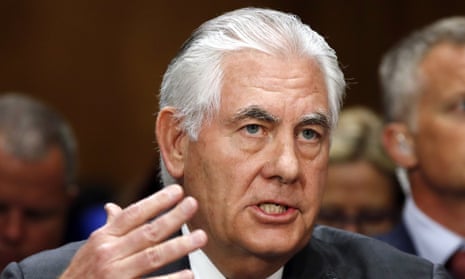The US state department has issued a stinging rebuke to Saudi Arabia and its Gulf allies saying they had failed to come up with a justification for the embargo they imposed on Qatar earlier this month.
The public and blunt criticism of Riyadh and the United Arab Emirates marked a sharp about-turn from Donald Trump’s wholehearted backing for the embargo, and his accusations of terrorist funding against Qatar. It follows a increasing pattern in which the state and defence departments have pursued policies abroad that are far removed from Trump’s rhetoric.
“Now that it has been more than two weeks since the embargo started, we are mystified that the Gulf states have not released to the Qataris, nor to the public, the details about the claims they are making toward Qatar,” Heather Nauert, the state department spokeswoman said.
“The more that time goes by, the more doubt is raised about the actions taken by Saudi Arabia and the UAE,” she added.
“At this point, we are left with one simple question: were the actions really about their concerns regarding Qatar’s alleged support for terrorism? Or were they about the long-simmering grievances between and among the GCC [Gulf Cooperation Council] countries?”
Trump was feted by Saudi Arabia when he made Riyadh the destination of his first trip abroad as president, on 20 May. Riyadh declared its embargo on Qatar just over two weeks later and Trump made repeated statements in support of the move, appearing to take at face value Riyadh’s justification that it was to punish Doha for its backing of terrorist groups.
In a tweet on June 6, Trump even appeared to claim credit for the blockade, suggesting it showed that his trip to Riyadh was “paying off”
“The nation of Qatar, unfortunately, has historically been a funder of terrorism at a very high level,” Trump said in the Rose Garden three days later. “We have to stop the funding of terrorism.”
But last week, the defence secretary, James Mattis, signed an arms deal in which the US sold Qatar 36 F-15 fighter planes, worth $12bn.
In her remarks on Tuesday, Nauert denied that the secretary of state, Rex Tillerson, was taking a position that entirely contradicted the initial stance adopted by Trump.
“I don’t think so at all. I think the president and the secretary both want to see this resolved. They want results, and let’s see this resolved quickly,” Nauert said. She added that Tillerson no longer saw any need to act as a mediator in the Qatar dispute.
Nauert said Tillerson had spent the two weeks since the embargo talking to the protagonists and regional leaders in person and on the phone, but no longer saw any point in continuing mediation.
“The president had offered secretary Tillerson weeks ago to do that. At this point, we don’t think that is necessary. We believe through the secretary’s talks, through talking with those nations and hearing what they have to say, that they’ll be able to work this out on their own,” Nauert said.
She added: “There comes a certain point where you say, folks, let’s get this done, let’s get moving along. The secretary likes results.”
Days before the embargo was declared, the Qatari state news agency was hacked and a report planted that quoted the emir as casting doubt on how long Trump would last in office, advocating closer ties with Iran and supporting Hamas. The report on 23 May was one of the pretexts for the punitive measures imposed on Qatar. Egypt and Bahrain also cut ties with Gulf nation.
On Tuesday, Qatar’s attorney general claimed that the hack had come from the countries imposing the embargo.
“Qatar has evidence that certain iPhones originating from countries laying siege to Qatar were used in the hack,” Ali Bin Fetais al-Marri told reporters in Doha.
He did not name the countries, but an FBI investigation is reported to have pointed towards Russian hackers hired by Gulf clients.
The Gulf dispute is just one of several issues on which the state and defence departments appear to follow a different tack from the president. The divergence is particularly evident in matters connected to Russia. Tillerson and Mattis, supported by most congressional Republicans, have insisted sanctions on Russia for its military intervention in Ukraine and annexation of Crimea, remain in place until the Kremlin withdraws its forces. Trump has quietly sought to have the sanctions lifted.










